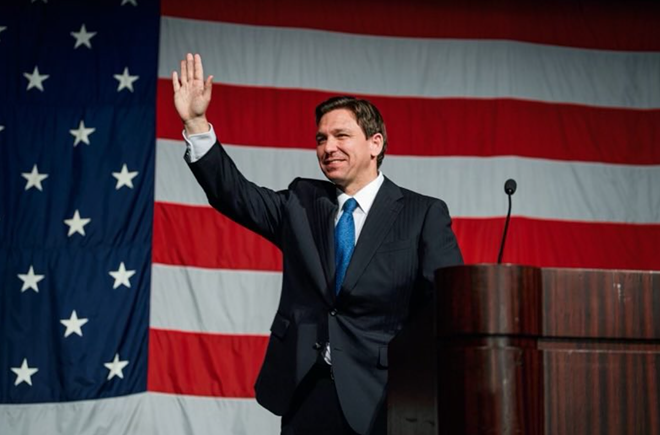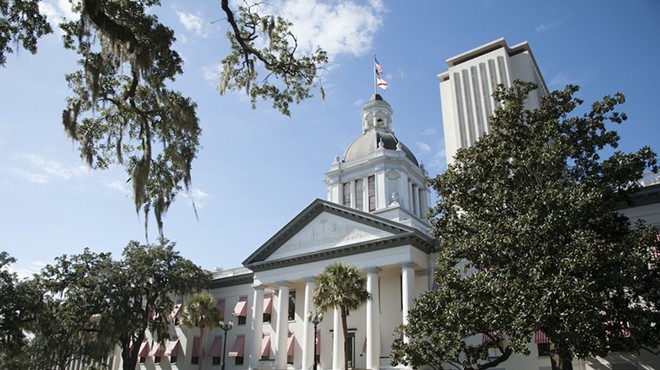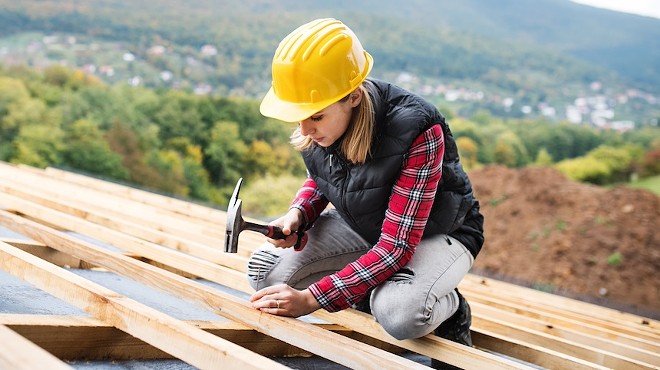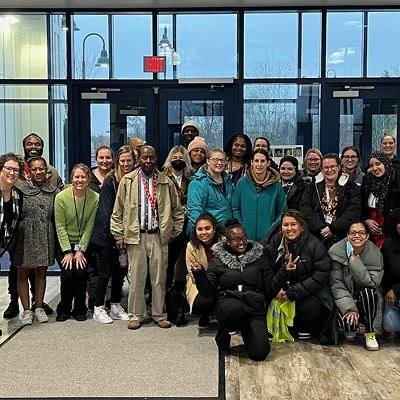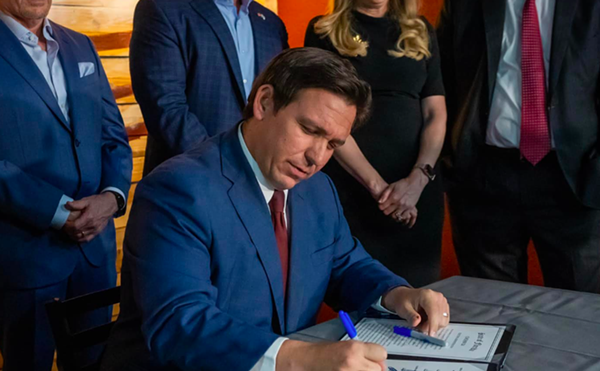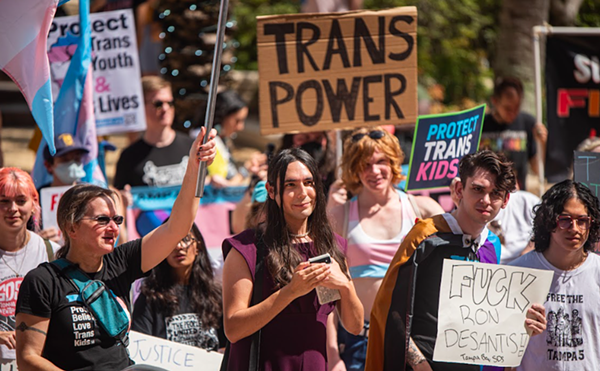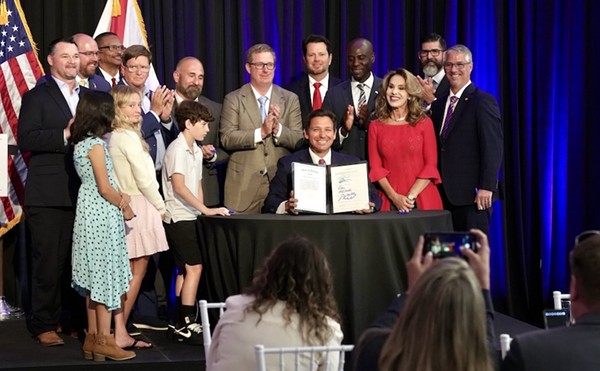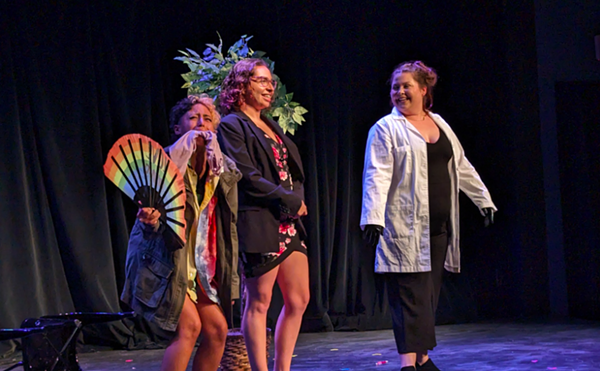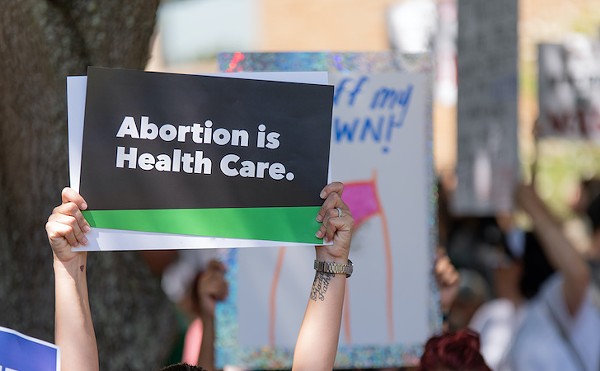The Florida Legislature and Gov. Ron DeSantis this year approved two separate bills that affect the state’s child labor laws. Both specifically loosen regulations for minors aged 16 and up, and will take effect July 1, 2024.
Orlando Weekly extensively covered both bills, including where they came from, arguments from those in support or opposition, and how they fit within a national context of rollbacks to child labor laws that have been proposed or enacted in states across the country.
Here's what passed during Florida's 2024 legislative session:
The first bill filed for consideration was House Bill 49, sponsored by Rep. Linda Chaney, R-St. Pete Beach. That bill — largely targeting restrictions on the number of hours older teens can legally work — passed mostly along party lines, with most Republicans in support and Democrats opposed.
The second bill was House Bill 917, sponsored by Rep. John Snyder, R-Hobe Sound. That bill — specifically loosening child labor restrictions on construction sites — passed with bipartisan support. Shortly after the final vote in the Florida House, some Democrats later changed their votes from “yes” to “no.”
OK, so what do these bills do?
The two pieces of legislation accomplish different aims. House Bill 49 was a more direct attempt to amend child labor law, while House Bill 917 was a broader bill that simply contained a section that affected child labor law.
Here are the broad strokes of House Bill 49:
Allows 16- and 17-year-olds who are home-schooled or enrolled in a virtual school program to work more than 30 hours per week during the school year. Currently, 30 hours is the max.
Allows other 16- and 17-year-olds to work more than 30 hours per week during the school year if they get signed permission from a parent or school superintendent. This expands a waiver process that the state already offers.
Allows 16- and 17-year-olds to work more than eight hours per day on a holiday or Sunday, even if they have school the next day.
Allows 16- and 17-year-olds to work more than six days in a row.
But, for the purpose of this explainer, we’re going to keep things focused on its amendment of Florida’s child labor statutes.
Here are the broad strokes of House Bill 917:It allows 16- and 17-year-olds to work on residential construction sites as long as they’re not working on any roofs, scaffolding or superstructures more than six feet off the ground. Currently, minors are prohibited under state and federal law from working on construction sites unless they are doing so as part of a school/apprenticeship program. This is because such work is deemed too “hazardous” for minors.
It requires certain guardrails to be in place in order for minors 16 and older to work on these construction sites. First, they must obtain OSHA-10 certification (this requires completing a basic 10-hour training course). They must also work under the direct supervision of an adult aged 21 or older who has at least two years of relevant job experience.
The bill also clarifies that no minor may perform work that violates any federal labor or safety rule regarding minors in the workplace.
Wait, wasn’t there a bill that’d allow bosses to put kids to work on roofs? Or what about that bill allowing kids to work overnight?
Those are both things that would have been legalized if the two bills had been passed as they were originally filed. However, both bills were amended by lawmakers as they advanced through the state Legislature.
An earlier version of the construction bill on the Senate side, for instance, would have allowed teens 16 and older to work on roofs or scaffolding at any height — even though that’s a clear violation of federal child labor law, and thus, would have conflicted with federal rules. Iowa lawmakers got their own warning from the feds last year over a similar issue.
Later on, however, the construction bill, was changed to retain Florida’s current six-feet height limit. We noted these updates and amendments to the bill in several articles. You can read our coverage for more information about how and when these bills were amended.
What did supporters have to say about these Florida bills loosening child labor law?
Supporters defended the legislation by arguing it would give teens the “freedom” and “flexibility” to work longer hours, in a wider range of jobs. Current law limits how early and how late teens can work during the school year, and requires mandatory breaks every four hours.
Supporters also argued the legislation would help working-class teens support their families, and argued that this would help teens gain self-sufficiency.
Aren’t teens allowed to work already?
Correct. Florida allows for children age 14 and up to enter the workforce.
Minors are barred from being employed in a job classified as a “hazardous” occupation under state or federal law (e.g. roofing, meat-packing), with exceptions for teens enrolled in a government-approved student learner or apprenticeship program.
Florida law has a laundry list of other exceptions, including for minors working in the entertainment industry, minors who work as babysitters, minors employed by their parents, etc.
Supporters of the bills, however, argued that Florida’s child labor protections were still too restrictive and burdensome for employers. Samantha Padgett, a lobbyist for the Florida Restaurant & Lodging Association, said such restrictions/protections deterred employers from hiring minors.
Lobbyists for the home-builder and construction industries also said that there are too few opportunities in Florida schools for teens to get hands-on experience in the construction trades as it is. While the state has a Career and Technical Education program, lobbyists said there’s disparate access to construction programs across different school districts.
Where did these child labor bills come from?
Right, so you probably assumed these bills were drafted by the politicians who filed and championed them, right?
Nope. Let’s address HB 49 first.
Orlando Weekly obtained emails through a public records request that show a lobbyist for the Opportunity Solutions Project — a lobbying arm of the Foundation for Government Accountability — emailed draft legislation to a legislative aide for bill sponsor Linda Chaney, titled “Youth Worker Freedom,” last August.
(Note: More Perfect Union shared these email/text records with Orlando Weekly last year, after we had filed a similar, broader public records request. Our request, containing the same email and text message records, was fulfilled in February, after we had already reported on them.)
The Foundation for Government Accountability is a right-wing think tank based in Florida that has lobbied for similar legislation in other states. It also has a history of lobbying for policies that aim to broadly undermine the social safety net — by, for instance, making it harder to obtain unemployment benefits, food stamps and Medicaid insurance.
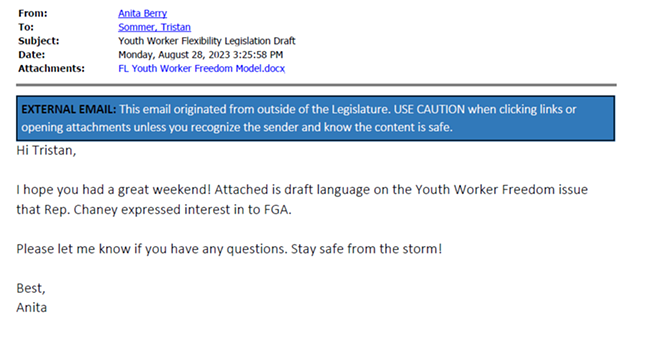
House Bill 917, on the other hand, came from lobbyists for the Associated Builders and Contractors of Florida and the Florida Home Builders Association — two industry trade groups that represent the interests of home builders and construction contractors.
We know this because we got a paper trail of that through a public records request, too. Specifically, we obtained emails that show Carol Bowen, chief lobbyist for the ABC of Florida, emailed draft legislation of the Senate version of the bill (SB 460) to Sen. Corey Simon, the bill sponsor, with a lobbyist for the FHBA cc’ed.
Later, during public testimony on the House version of the bill (HB 917), Bowen publicly admitted her involvement. “I told him [Snyder] we were going to give him an easy bill this session,” Bowen joked during a committee meeting in January. “Clearly I lied, and I owe him a free year without us next year.”
Related
Nope. According to the Economic Policy Institute, at least 31 states have introduced bills that would weaken child labor protections since 2021. Of those, 14 have passed or enacted bills, including Florida.
The Foundation for Government Accountability — the Florida-based think tank behind HB 49 — has been involved in drafting or lobbying for several of these, an investigation by the Washington Post first found.
But Chambers of Commerce and other major industry groups — representing employers in the restaurant, retail, and construction industries — have also publicly supported child labor rollbacks. So have right-wing organizations like Americans for Prosperity, a billionaire-funded group founded by Charles and David Koch.
Many of these groups — including the Florida Chamber of Commerce — have similarly lobbied in favor of anti-union legislation and other anti-worker legislation.
Was there opposition to Florida’s child labor bills?
Yes. Most of the people who came out to public testimony on the bills during their committee hearings expressed opposition to them, including teachers, workers in the trades, and representatives from social advocacy and labor organizations.
A group of 100 nonprofits, children’s advocacy organizations, labor groups, and others sent letters to the Florida Legislature in January urging lawmakers to reject the bill.
Opponents warned that rolling back child labor protections could put the health and safety of minors at risk both on the job and off. A parent’s advocacy group — Moms Rising — even targeted Disney over its affiliation with the Florida Restaurant & Lodging Association, which supported HB 49.
Young workers are more susceptible to injuries and death on the job, and may be less likely to speak up if their boss isn’t paying them what they’re owed, or works them overtime without extra pay. This kind of behavior — wage theft — is common in the construction industry. And Florida doesn’t have a strong mechanism for combating that either.
Furthermore, even trades workers testified that the “guardrails” in House Bill 917, meant to help protect young workers on construction sites, would not be enough to protect them from dangers on the job.
Violations of Florida’s child labor law are punishable as a second-degree misdemeanor and by a fine of up to $2,500 per offense. A second-degree misdemeanor is punishable by up to 60 days in jail and/or a fine of up to $500.
Penalties under federal law are steeper. Under federal law, an employer can be fined up to $15,138 for each young worker who was the subject of a child labor violation, or up to $68,801 for each violation that causes the death or serious injury of a worker under 18. The feds have also been working on further bolstering penalties in an effort to further deter violations.
How often is child labor law actually enforced?
Good question. We wondered about that, too, so we asked the Florida Department of Business and Professional Regulation, the agency in charge of enforcement.
A spokesperson for that department told us over email in December that they had received 257 complaints related to child labor law during the last fiscal year, and took exactly five “enforcement actions.” Enforcement action, per the DBPR, means the employer was fined.
The spokesperson emphasized that this number doesn’t include “immediate corrective actions” taken by employers that are found to have violated the law.
As of December, the department shared that they have exactly seven personnel dedicated to enforcing child labor law across the state, covering thousands of businesses and worksites.
Is that it?
Well, the federal government is authorized to enforce federal child labor law, too. Florida's child labor laws, for the record, largely mirror federal law, with minor (no pun intended) differences regarding restrictions on work hours and such.According to public data, posted online by the U.S. Department of Labor, the department’s Wage and Hour Division confirmed 174 violations of child labor law in Florida last year.
Data shows these violations were discovered across 35 Florida businesses in total, affecting 145 minors (meaning, some businesses wracked up multiple violations).
Locally, the feds identified child labor violations last year at a Dunkin Donuts in Kissimmee, a Dairy Queen in Clermont, and another Dairy Queen in Kissimmee (operated by different franchise owners).
Altogether, these 35 businesses were assessed $136,595 in civil monetary penalties. A trampoline park in Largo faced the steepest fine of over $18,000 for 24 child labor law violations.
According to the U.S. Department of Labor, child labor violations in the U.S. South over the last couple of years were most commonly found in the restaurant, retail, construction and amusement industries.
Kids have also been found working in meat factories, in violation of the law, and on roofs — sometimes, with deadly consequences.Last year, a local roofing contractor in Lake Mary was fined over $50,000 in child labor penalties after a 15-year-old they put to work fell 20 feet from a home in Orlando, suffering severe head and spinal injuries. The boy was one of 688 minors the federal government found employed in dangerous jobs through investigations during the 2022 fiscal year.
Is this problem getting any better or worse?It appears the problem has gotten worse, with experts speculating this is due in part to a tight labor market as well as an influx of migrant children coming into the United States for work to support their families back home.
Construction, in particular, is one of the most common industries in which children crossing the southern border seek work in, an award-winning investigation by the New York Times found.According to the Times, this is because under-the-table roofing work pays better than other jobs these kids can find. Plus, there’s plenty of work.
Last October, the U.S. Department of Labor shared that number of U.S. minors working in violation of child labor law has spiked 88% since 2019.
Florida Sen. Keith Perry, a roofing contractor and co-sponsor of the Senate version of House Bill 917, argued the bill was unlikely to affect the number of child labor violations that occur, if employers are already violating the law as it is.
“I started roofing when I was 16 years old. I started my business when I was 17 years old — which was illegal, is still illegal, and will be illegal under this bill,” Perry stated candidly during a committee hearing on the legislation. “People who break the law are not going to follow the law anyway, whether this bill is passed or not.”
Where can I get more information about Florida's child labor laws, or call to report a violation?
You can find more information on Florida's child labor laws on the Florida Department of Business and Professional Regulation's website. The federal Department of Labor also has resources and information that might be helpful.
To report a violation, you can:
- File a complaint online with the Florida DBPR online
- Print and mail a complaint form to the Florida DBPR
- File a complaint online with the federal Wage and Hour division
- Call the federal Wage and Hour to report a violation at 1-866-487-9243
Follow us: Apple News | Google News | NewsBreak | Reddit | Instagram | Facebook | Twitter | or sign up for our RSS Feed

